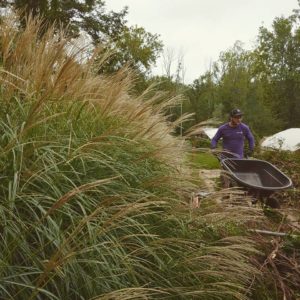November Lawn Care and Landscaping: We’re Tucking Your Lawn and Landscape to Bed for the Winter
It’s November, and that means your lawn and landscaping need some finishing touches before winter.
At Jamison Lawn Care, we’re busy completing last-minute jobs before winter arrives in Bucks and Montgomery Counties.
Jamison Lawn Care’s Fall Lawn and Landscape Program
Some of your lawn and landscape services are done for the winter. However, we continue to mow into November. Your turfgrass needs to be an inch shorter than usual so that the grass leaves don’t bend under the snow causing snow molds.
Also, you want your turf to be shorter to keep animals, such as rabbits, deer, and voles, from eating it during the winter.
Finally, we’ll wrap up our lawn fertilization program for the year. Your Jamison yard gets one more fertilizer application to help your turfgrass green-up in the spring and develop deep root systems over the winter.
Read more: Did You Know It’s Time for Your Lawn and Landscape Fall Cleanups?
Our final landscape jobs include the following:
- We weed your beds one last time.
- We put down a layer of mulch to keep plant roots moist and protect them from frost heaving.
- We finish pruning your shrubs and trees for the season.
- We remove your leaves in the garden beds and lawn.
- We cut back perennials and ornamental grasses.
We’re Still Doing Fall Cleanups
We’ll continue to clean up leaves and other yard debris into December, when some trees are bare. We pick up any fruits, nuts, seeds, and twigs to keep your yard looking tidy throughout the winter season.
At Jamison Lawn Care, we want your Warminster or Warwick Township home to look well-cared for and tidy for the long winter months.
Call us today at 267-621-4747 or fill out our contact form if you need our fall cleanup services.
Sources:
LoveYourLandscape.org, A Seasonal Guide: Winter Lawn and Landscape Care.
The Spruce.com, How to Winterize Your Lawn and Garden in Fall.
Plant of the Month: Winterberry
You’ve probably seen winterberry if you walk along trails by creeks and marshy areas since this native Pennsylvania shrub grows well in wetlands. You may also have winterberry gracing your Southampton landscape.
Winterberry comes in many varieties and loves moist, acidic soil. Winterberry (Ilex verticillata) is a deciduous shrub (meaning it loses its leaves in the fall) native to Bucks and Montgomery Counties.
Native winterberry can grow from 3′ to 12′ tall, and its spread (width) can range from 3′ – 12′.
Winterberry shrubs come in many varieties, including dwarf and shrubs with pinkish-orange berries:
- Aurantiaca
- Berry Poppins
- Cacapon
- La Have
- Oosterwijk
- Red sprite
- Winter Gold
- Winter Red.
Winterberry belongs to the holly family and produces tiny white blossoms in June and July. But most people put winterberry in their landscape because of the bright red berries that the shrub produces in the fall.
These berries stay a bright red throughout the winter giving your yard pops of color against the snow or during a gray, rainy day. Also, if you enjoy watching wildlife from the warmth of your home, you’ll be pleased that the following critters will visit your property:
- Bluebirds
- Catbirds
- Cedar waxwings
- Deer
- Mice
- Mockingbirds
- Raccoons
- Robins.
Female winterberries need fertilization from a male shrub to produce those delightful crimson berries. One male winterberry can pollinate five to 10 female bushes.
Learn more: What You Need to Know about Aeration, Overseeding, and Sodding
How to Care for Your Winterberry Shrubs
If you decide to add winterberries to your Hatboro property, you should plant them in moist, acidic soil. For example, if there’s an area that stays wet, such as a wetland or a rain garden, winterberries will thrive in those conditions.
Winterberries also flourish in soil that’s organic and loamy. You may need to fertilize or add soil amendments to keep the ground healthy.
Winterberries can tolerate other soil types, including clay soil, but they perform best in acidic, loamy earth.
Conversely, you don’t want to plant your winterberry shrubs in alkaline soil or dry soil.
You can get a soil test done on the area where you want to plant your winterberries to see if it’s acidic or alkaline soil. Then, we can add soil amendments to make the soil more acidic.
You’ll kill your winterberries if they don’t get enough water since they thrive in soils that stay wet.
While winterberry shrubs are low maintenance, they still need to be pruned in late winter or early spring before new wood growth appears. Pruning winterberries control suckers, keep the plant’s natural shape, and help the bush to grow tall.
Winterberries Are Poisonous
Those beautiful red berries that the birds love in wintertime are poisonous to cats, dogs, and humans. Plant these shrubs at the outer parts of your property to prevent your children and pets from eating them.
Late fall is the perfect time to add winterberries or other shrubs to your Jamison Township property. Call us today to install your winterberry shrubs at 267-621-4747 or fill out our contact form.
Jamison Lawn Care serves homeowners and commercial properties in Buckingham and Warwick Townships, including these Pennsylvania towns: Chalfont, Doylestown, Furlong, Hatboro, Horsham, Jamison, Southampton, Warminster, Warrington, and Warwick.
Sources:
MissouriBotanicalGarden.org, Ilex verticillata.
TheSpruce.com, How to Grow Winterberry Holly.
|
|
Jamison Lawn Care | 267-621-4747
P.O. Box 32, PA 18929
www.jamisonlawncare.com
|
|

|
|




